US, UK militaries shoot down Iranian drones launched at Israel
Iran has launched an attack against Israel using hundreds of suicide drones, prompting a major response from Western militaries stationed in the region.
Iran has launched an attack against Israel using hundreds of suicide drones, the Jewish state has confirmed.
Axios journalist Barak Ravid, citing a senior Israeli official, reported that hundreds of drones were headed for Israel.
Other reports put the drone swarm at “dozens.”
“Iran launched UAVs from its territory towards the territory of the state of Israel,” Israel’s military spokesman Daniel Hagari said in a televised statement.
“We are working in close cooperation with the United States and our partners in the region in order to act against the launches and intercept them.”
At around 9am (AEST), Israeli army radio reported that more than 100 drones were intercepted outside Israeli territory with assistance from US and UK militaries.
As of 10.20am, the IDF confirmed over 200 drones had been launched at the nation.
Separate reports say the US shot down an undisclosed amount of Iranian drone aircraft headed towards Israel.
Sirens have been sounding throughout the night in Israel, with civilians in high risk zones told to stay near bomb shelters.
Israeli authorities confirmed a 10-year-old girl was severely injured by shrapnel from an interceptor missile launched in the Negev region in the nation’s south.
The girl suffered a head injury and was taken to hospital for further treatment.
The UK Ministry of Defence says British Royal Air Force jets in the Middle East “will intercept any airborne attacks within range of our existing missions, as required”.
“In response to increased Iranian threats and the growing risk of escalation in the Middle East, the UK Government has been working with partners across the region to encourage de-escalation and prevent further attacks,” it said in a statement.
Analysts warn Israel’s complex missile defence system has never faced an attack of this scale before.
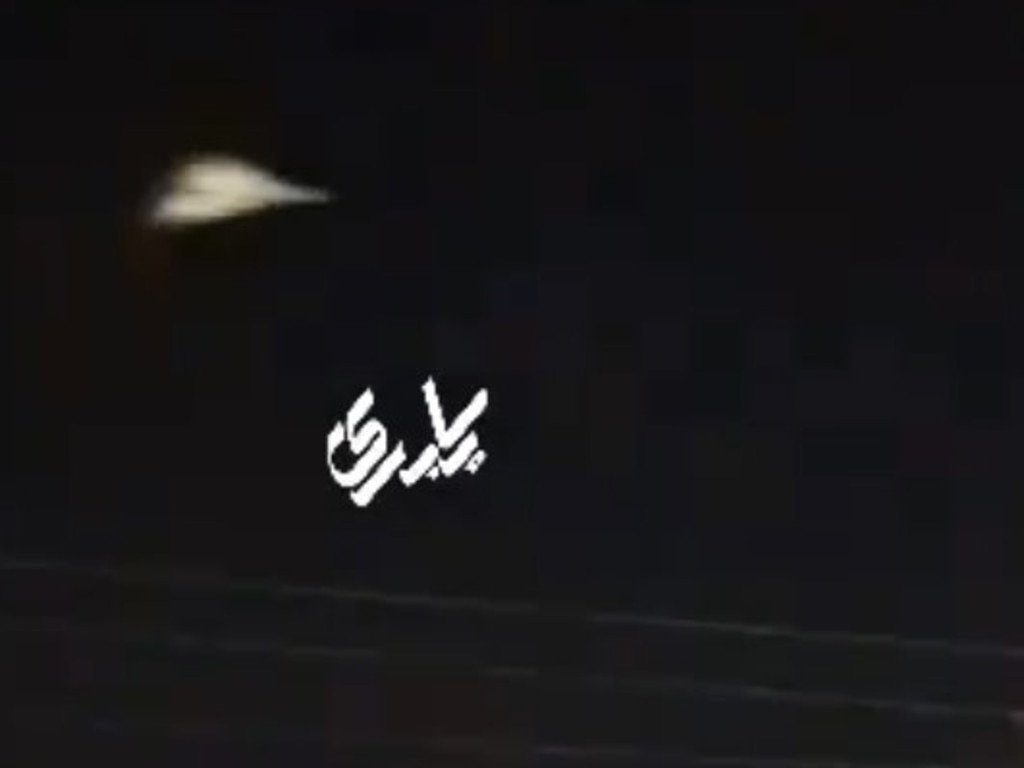
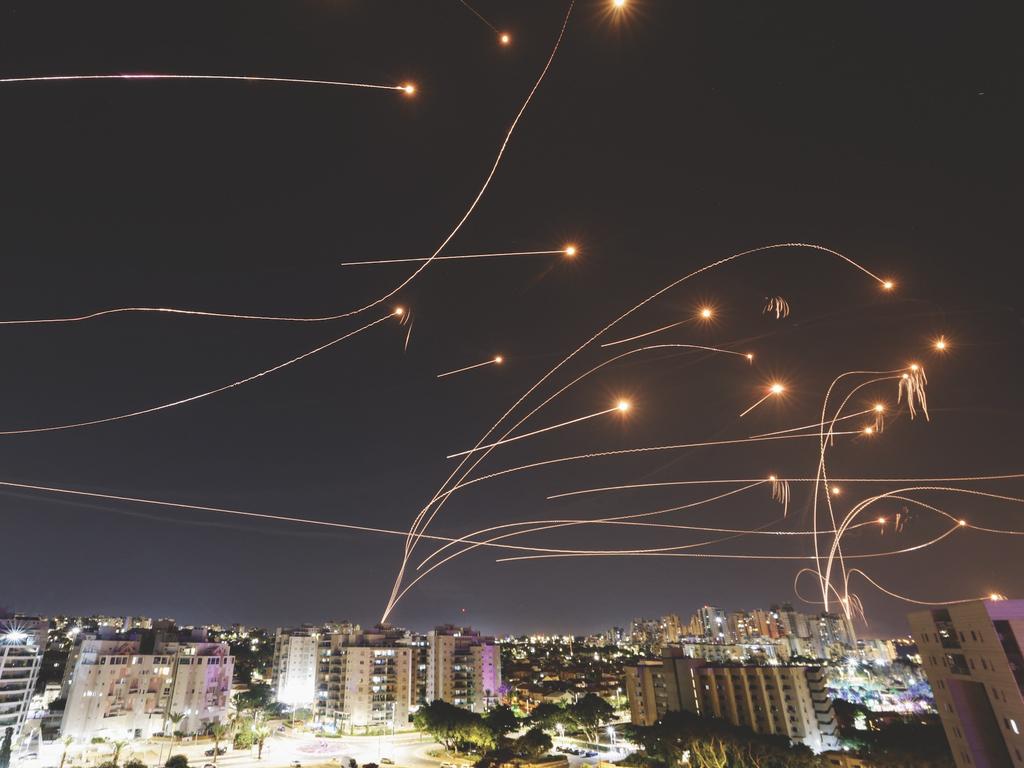
The drones were expected to take two hours or less to reach Israeli air space, an expert told The Post. Officials believe they’re destined for military targets.
In response, Israel announced restrictions on civilian activities.
The Times of Israel reports the guidelines prohibit educational activities and bans gatherings over 1000 people.
Stricter restrictions have been imposed in areas that abut Gaza.
Iraq, Israel and Jordan have all reportedly closed their airspaces in response.
Prime Minister Benjamin Netanyahu addressed the nation, saying the country was preparing for a direct attack, and will respond accordingly.
“Citizens of Israel, in recent years, and even more so in recent weeks, Israel has been preparing for the possibility of a direct attack from Iran,” Netanyahu said.
“Our defense systems are deployed, and we are prepared for any scenario, both in defense and offense. The State of Israel is strong, the IDF is strong, the public is strong.”
Meanwhile, America has vowed to provide military support.
President Joe Biden rushed back to the White House on Saturday evening from his weekend beach getaway in Delaware.
“This attack is likely to unfold over a number of hours,” US National Security Council spokesperson Adrienne Watson said in a statement, adding that “the United States will stand with the people of Israel and support their defense against these threats from Iran.
Jonathan Schanzer, senior vice president of research at the Foundation for Defense of Democracies, said any direct hit by Iranian drones on Israeli soil “will probably” elicit a response ten-fold.
“If Israel is hit and is hit in a sensitive location, Israel will respond heavily,” he said.
He added Iran launching drone strikes “is obviously a significant escalation. There’s no other way to put this.”
Schanzer said in theory there’s “very little” difference between Iran directly attacking Israel versus directly conducting a strike on Jerusalem, but that the optics of a direct launch from Tehran “gives Israel an opportunity now to turn the tables on the regime.”
German Foreign Minister Annalena Baerbock said the escalation could plunge the entire continent into chaos.
“We condemn the ongoing attack in the strongest possible terms, risking to plunge an entire region into chaos,” Baerbock wrote on X.
“Iran and its proxies must stop this immediately. In these hours, we stand firmly by Israel.”
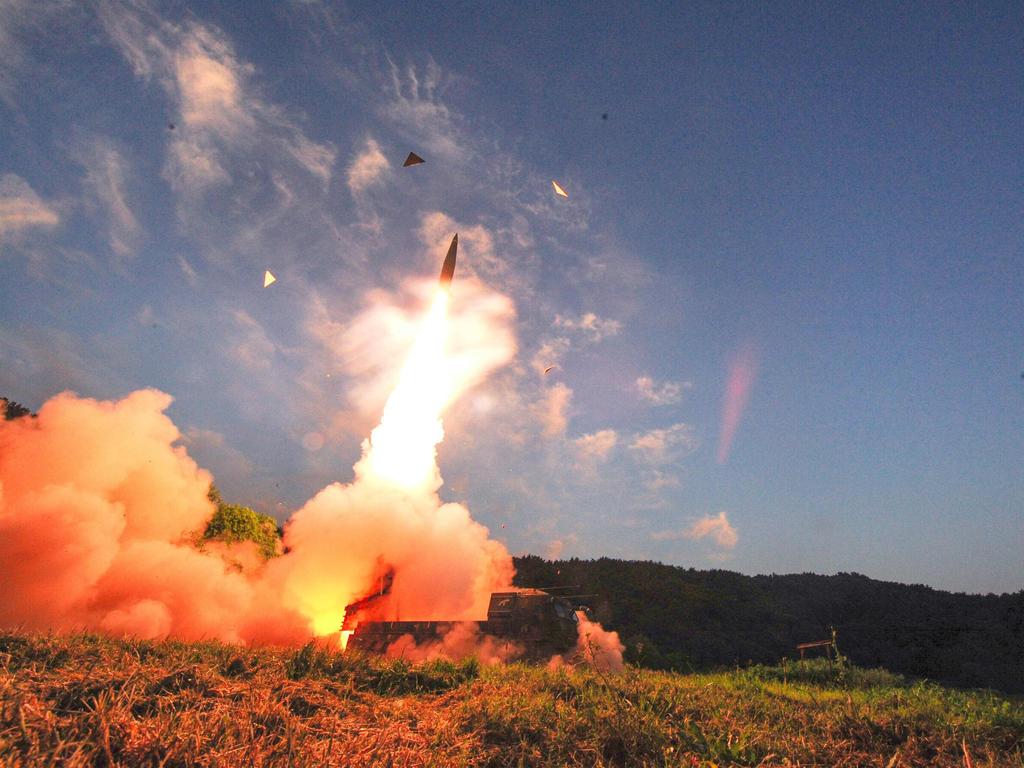
Iran asserts ‘inherent right to self defence’
Iran’s Foreign Ministry says the attack is a direct response to what it described as “the aggressive act of the Zionist regime against the Iranian embassy in Damascus.”
In a statement released on Telegram today, the ministry said Iran’s military was “exercising the inherent right of self-defense stipulated in Article 5 of the United Nations Charter and in response to the repeated military aggressions of the Zionist regime and the martyrdom of the official military advisors of Iran who were working in this country [Syria] at the invitation of the Syrian government.”
“The Islamic Republic of Iran’s recourse to defensive measures in exercising the right to self-defense shows Iran’s responsible approach to regional and international peace and security at a time when the illegal and genocidal actions by the Zionist apartheid regime against the Palestinian nation and the regime’s repeated military aggression.”
Analysts say Iran could have wreaked more havoc on Israel if it wanted to, claiming the attack was a means to “save face” after the attack on their Damascus embassy.
US pledges support, warned Iran attack was ‘imminent’
Earlier, the US pledged its unequivocal support for Israel after admitting attacks from Iran were now “imminent”.
Iran had threatened retaliation over a strike that destroyed an Iranian consulate building in Damascus, killing two generals.
Supreme leader Ali Khamenei stoked tensions this week by labelling the Israeli government as an “evil” entity that “must be punished”.
Khamenei said the April 1 strike had ripped apart previous international agreements providing for the inviolability of diplomatic premises.
“The consulate and embassy offices in any country are the territory of that country,” he said. “When they attacked our consulate, it means they attacked our territory.”
Israeli Foreign Minister Israel Katz quickly hit back with a statement on social media, confirming Israel was not afraid to trade blows with the Middle Eastern superpower even as conflict continues to rage in Gaza.
“If Iran attacks from its territory, Israel will respond and attack Iran,” he said.
Despite his public criticism of Prime Minister Netanyahu over the toll on civilians in Israel’s campaign against Hamas, Joe Biden has confirmed his administration will back Israel 100 per cent.
But a devastating strike on an aid convoy muddied waters with Israel’s allies. Seven charity workers were killed in the “outrageous” drone strike, which sparked tense phone calls between President Biden and Mr Netanyahu.
Mr Biden finally warned that the United States would be forced to change policy if Israel did not change its own practices on Gaza.
But US forces have been told to remain on standby as Iran’s forces threaten “to launch a significant attack on Israel”.
“We want to address the Iranian threat – they’re threatening to launch a significant attack in Israel,” President Biden said.
“As I told Prime Minister [Benjamin] Netanyahu, our commitment to Israel’s security against these threats from Iran and its proxies is ironclad. Let me say it again, ironclad: all we can to protect Israel’s security.”
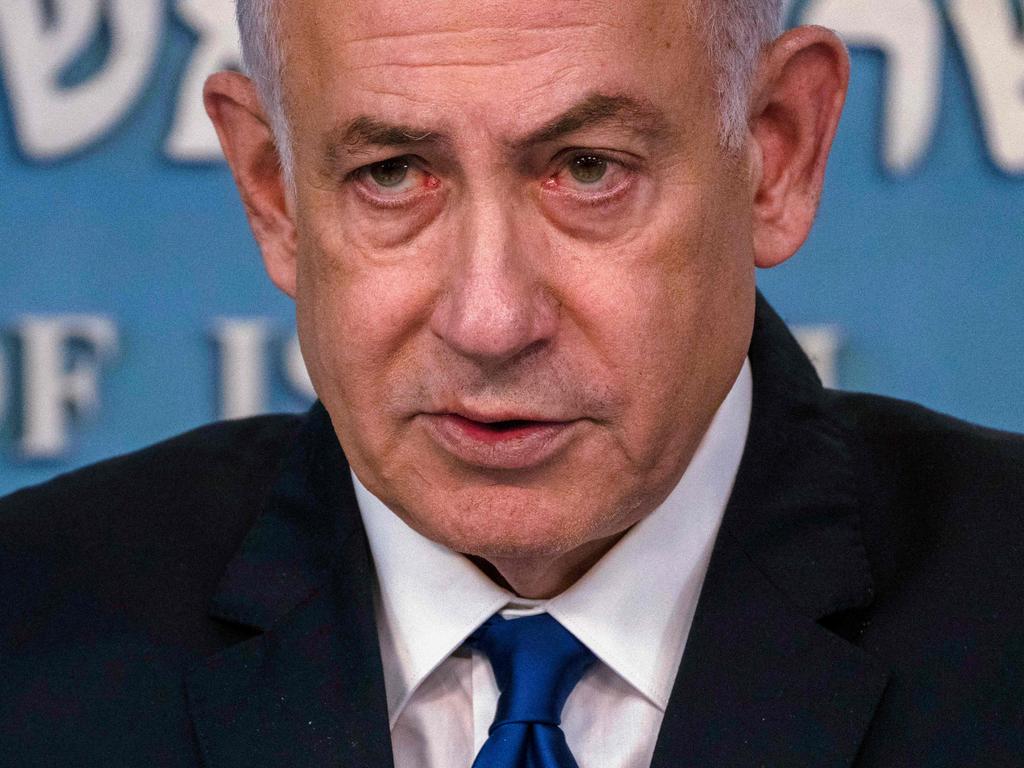
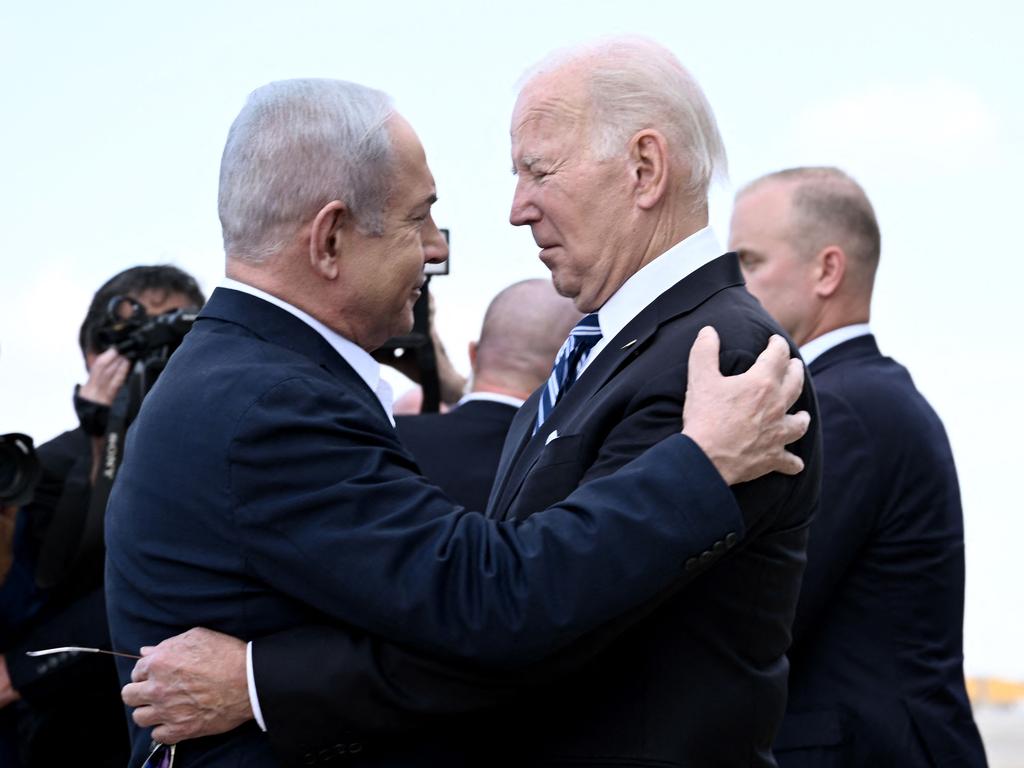
Amid the heightened risks, German airline Lufthansa on Wednesday announced it had suspended flights to and from Tehran, probably until Thursday, saying it was “due to the current situation in the Middle East.”
International leaders have scurried to prevent the crisis from bubbling over into Lebanon, where Iran supports the Shiite militant movement Hezbollah.
With the US presidential election looming in November, Mr Biden also faces growing opposition to his Gaza policy from Muslim and young voters, with key allies calling on him to change course.
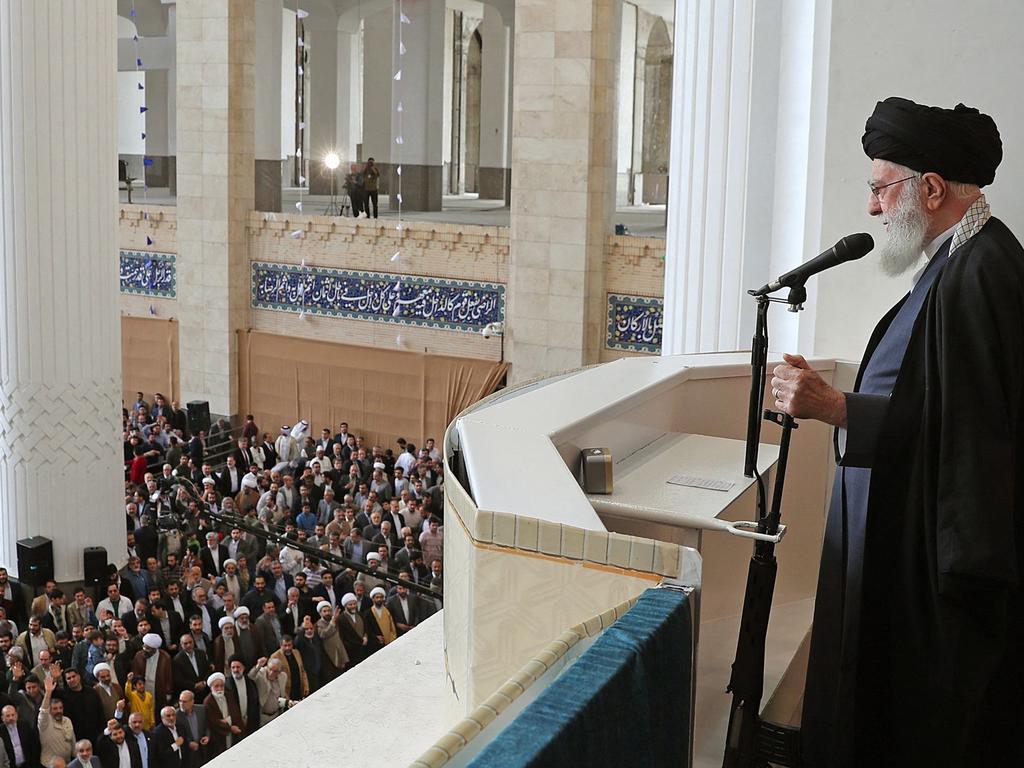
Family members of some of the US hostages taken by Hamas during the attacks met Vice President Kamala Harris at the White House on Tuesday as the negotiations for a deal continue.
“We need results. We need our people home,” Rachel Goldberg, whose son Hersh Goldberg-Polin was among those captured, told reporters.
Jonathan Dekel-Chen, the father of American hostage Sagui Dekel-Chen, pushed Hamas to agree to a deal.
“It is in their court. There is no reason not to move forward on this deal,” he said.
Israel is now facing internal pressure as the issue of hostages still trapped in Gaza since October 7
Thousands gathered on Sunday in front of Israel’s parliament, exactly six months after the devastating day that has rewritten the history of the troubled region.
About 250 Israelis and foreigners were taken hostage by militants. The army says 129 are still being held in Gaza, including 34 who are presumed dead.
After a massive anti-government demonstration in Tel Aviv on Saturday, which also heard emotional calls to free the hostages, organisers of the Jerusalem rally attempted to be apolitical.
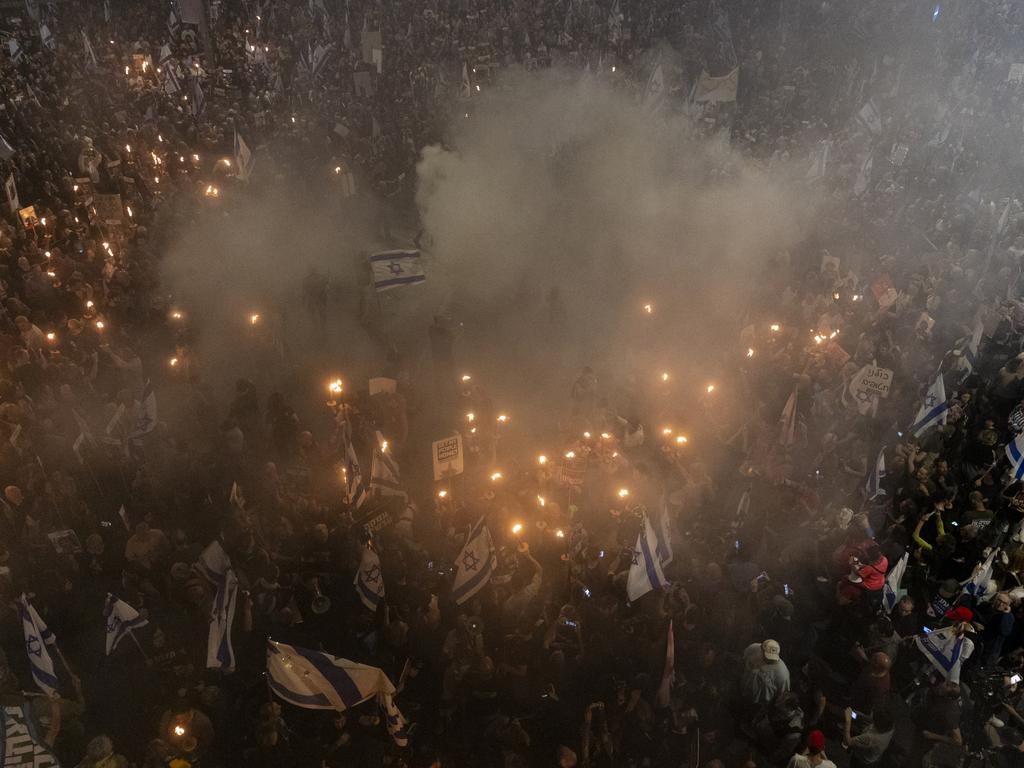
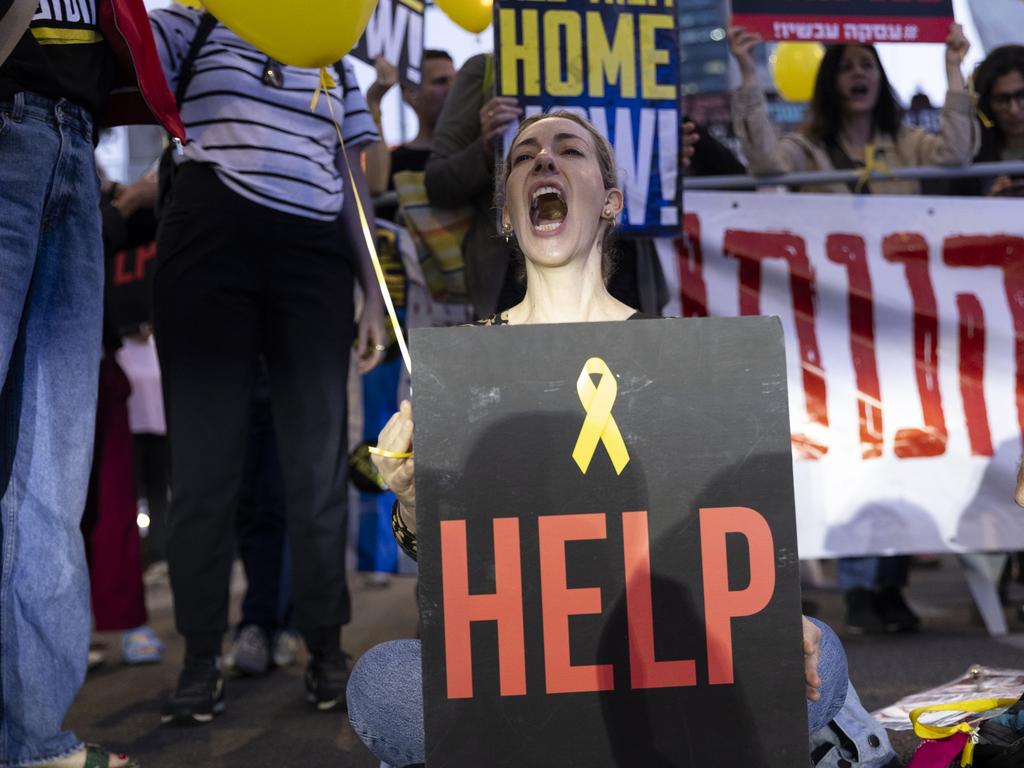
Protesters have taken aim at Mr Netanyahu who is frequently accused of not doing enough to free them.
Other hostage families have accused Mr Netanyahu of trying to blacken their reputations and accusing them of being “traitors” for protesting in wartime.
But Mr Netanyahu vowed on Sunday that the war would not end until all the hostages are released.
The Gaza war broke out on October 7 with an attack by Hamas militants that resulted in the deaths of 1,170 people, mostly civilians, Israeli figures show.
Israel’s retaliatory offensive has killed at least 33,175 people in Gaza, mostly women and children, according to the health ministry in the Hamas-run territory.





